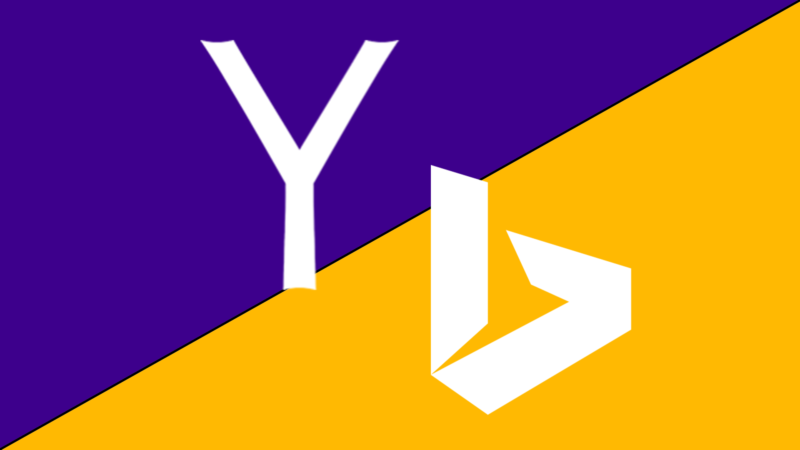FAQ: The New Yahoo-Microsoft Deal, Explained
Yahoo and Microsoft have reached new terms in their search partnership that was created in 2009. Here's how the new deal will work to give Yahoo more flexibility about ads.
Yahoo and Microsoft have renewed their search partnership. What’s changed? What’s staying the same? Here’s the rundown.
What Was The Old Deal?
The core of the old deal was that Yahoo had to run Microsoft’s Bing ads for desktop searches. It didn’t have to for mobile searches but largely did until last year. Unpaid “organic” search results at Yahoo were provided by Bing.
The New Deal Gives Yahoo More Control Over Desktop?
That’s right. Under the new deal, 51% of all desktop searches have to carry Bing ads. The rest can come from however Yahoo wants.
What About Mobile & This “Yahoo Gemini” Thing?
Yahoo has been able to do whatever it wants with mobile, which is defined under the new deal as both smartphone and tablet searches. It’s not clear if tablets were considered mobile in the old deal.
Last year, Yahoo launched Yahoo Gemini. That’s a platform that allows advertisers to purchase both mobile ads and native ads in one place, to run on Yahoo properties. Gemini has been powering mobile search ads for Yahoo. That’s going to continue, though Yahoo potentially could carry ads from others, including Bing.
Could Yahoo Use Google Ads?
Maybe! Google publicly expressed renewed interest about this in 2012. Google had actually wanted to be Yahoo’s partner back in 2008. However, the US Department Of Justice threatened antitrust action. That’s how Yahoo ultimately ended up going with Microsoft.
Potentially, legal threats could reemerge if Yahoo wanted to work with Google again. However, the terms would be different. Google wouldn’t be powering all of Yahoo. Yahoo might be able to argue that Google’s desktop ads will earn Yahoo more money, allowing it to stay stronger. Meanwhile, Bing just ticked over having a 20% share of the US search market.
How Does Ad Selling Change?
Yahoo has been handling ad sales for “premium” buyers — major advertisers and brands — for both Yahoo and Bing. Bing was handling sales for when advertisers would purchase directly, typically self-serve through the Bing Ads platform.
Now things are clearly divided. Yahoo will sell Yahoo ads; Bing will sell Bing ads.
So Bing Ads Still Appear On Yahoo? Will Yahoo Ads Appear on Bing?
If you buy from Bing, that means your ad might appear on Yahoo on desktop some of the time, because some of the time Yahoo will be running them. Potentially, you might show up on Yahoo in mobile, if for whatever reason Yahoo decides it wants to carry Bing ads. It has the option, but it probably won’t happen.
If you buy from Yahoo, then your ad will appear on Yahoo mobile at first, then Yahoo desktop if Yahoo begins using Yahoo Gemini for that, as expected. Yahoo ads have no distribution with Bing, so you won’t be showing up there.
In short, buying Bing gives you Bing plus some Yahoo desktop distribution. If you want Yahoo mobile distribution, as well as potentially more Yahoo desktop visibility, you’ll need to also buy Yahoo separately.
Why Does Yahoo Want To Run Its Own Ads?
Bing’s ads have a long history of performing far worse than both Yahoo and Bing expected, when the deal was struck. For several years, Microsoft even had to pay a revenue guarantee to make up the shortfall.
Running its own ads means Yahoo can experiment and potentially generate more revenue per ads than using Bing’s, even though Yahoo also has to carry the expense of running its own ad platform. But since Yahoo needs Yahoo Gemini to help deliver non-search native ads, this seems a worthwhile investment.
Related: potentially a third-party like Google might be able to deliver ads that generate more revenue than Yahoo itself could manage. One reason is because Google has so many advertisers, they might bid against each other higher for inventory. The deal gives Yahoo the flexibility to try and make more money not just off its own ads but also off other third-party partners.
What About Organic / Non-Paid Search Results?
Organic / non-paid web search results will continue to be provided to Yahoo by Bing. Yahoo gave up its core technology to generate such results as part of the original deal, and that doesn’t appear to have changed with the new one.
Yahoo does have the ability to build new search technologies, however. The company could also partner with another third partner for search results, as long as those results remain 49% of the overall share — ensuring that Microsoft / Bing get 51%.
So is Google suddenly going to power half of Yahoo’s results? Possible under the new flexible deal, but I wouldn’t expect that. This is especially given that Yahoo said the areas its most interested in developing are vertical search and contextual / predictive search, as highlighted today.
Opinions expressed in this article are those of the guest author and not necessarily MarTech. Staff authors are listed here.
Related stories
